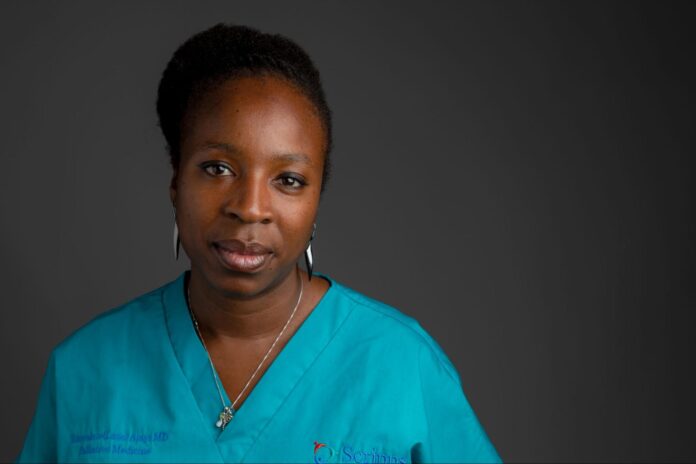
Addressing maternal health for Black women
By Dr. Toluwalase Ajayi
We have all seen the devastating headlines about how dangerous it is to give birth in America as a Black person. The facts are stark: Black women are three times more likely to die during childbirth than their non-Hispanic white counterparts, and non-Hispanic Black infants are twice as likely to die within their first year of life in comparison to non-Hispanic white infants. The question is “why?”
My name is Dr. Toluwalase (Lasé) Ajayi, and I am the lead scientist for PowerMom, a mobile research platform that invites participants to contribute pregnancy-related health information via app-based surveys and wearable sensors. Our goal is to use this data to help reduce health disparities while learning what makes a healthy pregnancy for every pregnant person.
As a Black mother of three beautiful children, this is more than a study for me, it is real life. When I was pregnant with my eldest daughter (now 4 years old), I almost became a statistic. Despite being a physician who sought medical care in the same health system where I work, I was a victim of racism and implicit bias.
It started when I had to go to the emergency room in the middle of the night due to excruciating pain from my fibroids. As I got out of the Uber clearly in pain (my husband had to stay home with our son), not a single hospital staff offered to help me. The Uber driver assisted me to the entrance. There, things only got worse. The check-in nurse did not believe my pain. The ultrasonographer was so rough that I had to tell him—with tears streaming down my face—that he was hurting me. He all but ignored my pain, saying that he needed to complete his scan to get good images. It wasn’t until the person who checks insurance realized that I was a physician within the health system, and in that hospital no less, did the staff demeanor change when interacting with me, becoming more compassionate.
However, I continued to face racism. When the physician gave me a prescription for a combination opioid and Tylenol for the intense pain, the check-in nurse told me that I should not take that medicine because “women like me” were more likely to get addicted and risk hurting the baby.
I can still remember that experience vividly. When I told my OBGYN, she was outraged for me; she and her clinical staff helped me feel supported and understood the pain I was in. She encouraged me to take the pain medicine if I needed it. I am beyond grateful that I was able to change my obstetrician and work with a team of caring practitioners who listened to me. Not everyone who looks like me is as lucky. I never did take the medicine, and even after two cesarean sections the only pain medications I used were Motrin. I refused to give anyone a reason to judge me or my babies. It shouldn’t have to be this way.
This is why one of the studies I pushed to launch on the PowerMom platform is designed to investigate the effect of structural racism on maternal health outcomes. With support from Fitbit, this study will monitor the pregnancy journey and health outcomes of diverse individuals and assess the toll that structural racism takes on our bodies. We are aiming to collect enough data from participants to begin to break down and address these many contributing factors to maternal mortality. Eligible participants will receive a Fitbit, a smart scale and compensation for completing the study.
This is just one example of the innovative work we do at PowerMom. By partnering with community advocacy groups and our participant advisory board, we make sure that valuable, diverse input is incorporated into the design of our studies, and we share meaningful data with participants. Our partners also include obstetricians who can help change the way care is provided, and insurance companies who can determine how care is reimbursed. The work we do at PowerMom is focused on helping to transform pregnancy care with the goal of producing healthy babies and pregnancies for everyone, because every voice matters.
To learn more, visit: powermom.scripps.edu.


